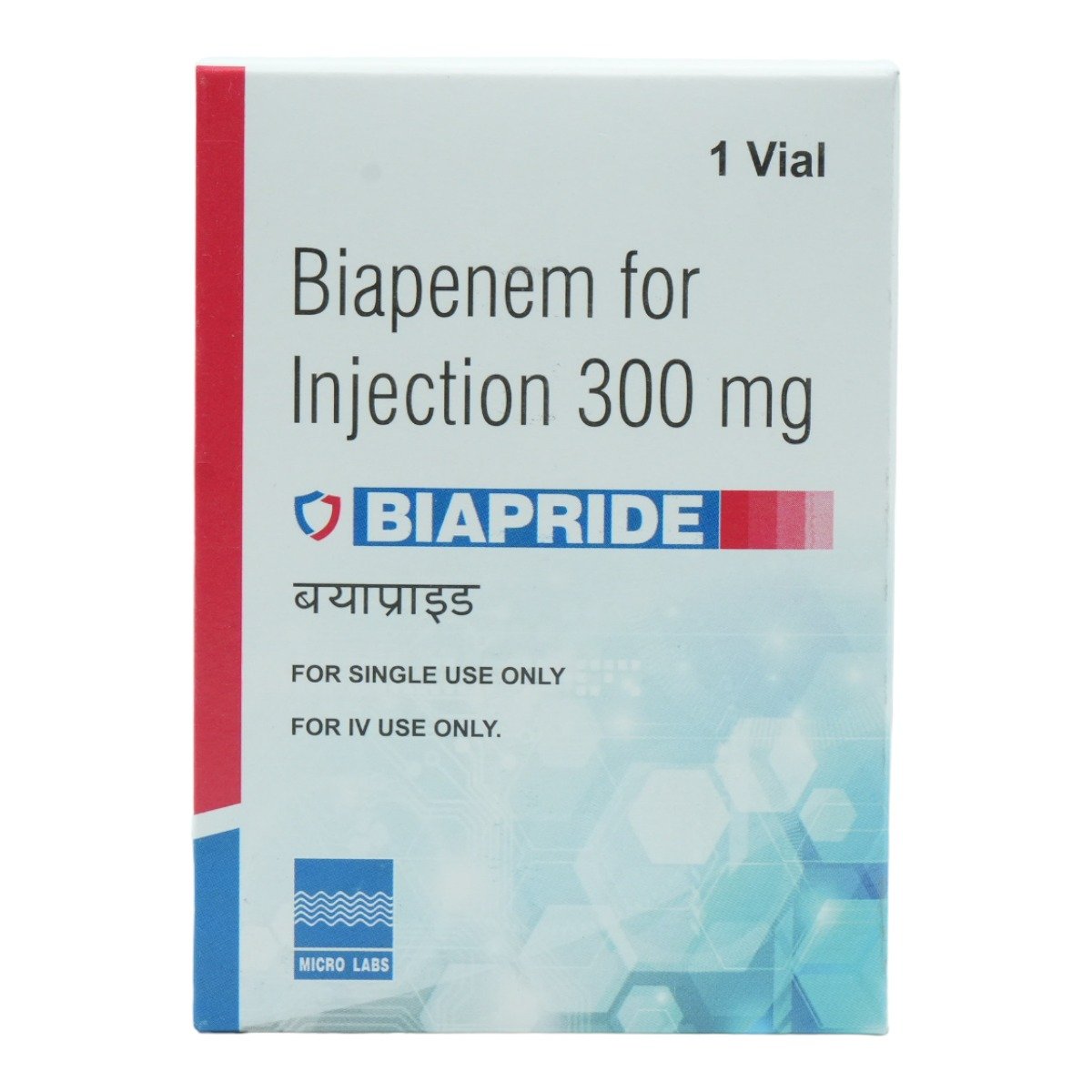Biapenem
About Biapenem
Biapenem belongs to the class of antibiotics indicated to treat a wide range of various bacterial infectious diseases such as Septicemia, Lower respiratory infections, Complicated urinary tract infections and Intra-abdominal infections. Bacterial infections are illnesses or conditions caused by bacterial growth or toxins (poisons).
Biapenem contains Biapenem; it penetrates the cell wall of most gram-positive/gram-negative bacteria to bind penicillin-binding protein (PBP) targets and inhibits bacterial cell wall synthesis, thereby killing the bacteria and treating bacterial infection.
A healthcare expert will administer Biapenem; do not self-administer. In some cases, Biapenem may cause side effects such as injection site reactions, diarrhoea, nausea, and vomiting. Most of these side effects do not require medical attention and resolve over time. However, if the side effects persist or worsen, consult your doctor.
Let your doctor know about your medical and medication history to avoid the occurrence of potential interactions. Inform your doctor if you are pregnant, breastfeeding, suspect you are pregnant or plan to have a baby; your doctor will weigh the benefits of Biapenem therapy against the risk to your baby. Caution should be exercised while using Biapenem in patients with Hemodialysis, so inform your doctor if you are undergoing Hemodialysis.
Uses of Biapenem
Medicinal Benefits
Biapenem is a novel parenteral broad spectrum Carbapenem class of antibiotic. It is widely distributed and penetrates well into various tissues and body fluids. It can exert antibacterial effects by inhibiting the synthesis of bacterial cell walls, with broad-spectrum antibacterial activity against Gram-positive and Gram-negative aerobic and anaerobic bacteria. Thus, it helps to treat Lower respiratory infections, Complicated urinary tract infections and Intra-abdominal infections.
Directions for Use
Storage
Side Effects of Biapenem
- Injection site reactions
- Skin eruptions/rashes
- Nausea
- Diarrhea
Drug Warnings
Do not take Biapenem if you are allergic to any contents. Before taking Biapenem, inform your doctor if you are pregnant or breastfeeding. Monitor and administer Biapenem carefully; reducing the dose or increasing the dosing interval is necessary for patients with severe renal impairment. To rule out any negative effects/interactions, inform your doctor about your health condition and all your medications.
Drug Interactions
Drug-Drug Interactions: No interactions found.
Drug-Food Interactions: No interactions found.
Drug-Disease Interactions: No interactions found.
Drug-Drug Interactions Checker List:
Safety Advice

Alcohol
cautionIt is not known if alcohol affects Biapenem. However, as a precautionary measure, it is advisable not to take or limit alcohol.

Pregnancy
cautionPlease consult the doctor, as there are no adequate and well-controlled studies on pregnant women. Your doctor will prescribe only if the benefits outweigh the risks.

Breast Feeding
cautionLimited information is available. Please consult the doctor if you are breastfeeding. A decision should be made whether to discontinue nursing or the medicine, considering the importance of the medicine to the mother.

Driving
cautionIt is unknown whether Biapenem alters the ability to drive, so do not drive or operate machinery if you experience any symptoms affecting your ability to concentrate and react.

Liver
cautionLimited information regarding using Biapenem in patients suffering from liver impairment is available. Please inform your doctor. Your doctor will prescribe only if the benefits outweigh the risks.

Kidney
cautionMonitor and administer Biapenem carefully. Reducing the dose or increasing the dosing interval is necessary in patients with severe kidney impairment.

Children
safe if prescribedThere was limited information about the usage of Biapenem in paediatric patients. Please seek medical advice. Only if the benefits exceed the dangers will your doctor prescribe.
Habit Forming
Diet & Lifestyle Advise
- After completing the course of Biapenem, probiotics should be taken to restore healthy bacteria in the intestine that may have been killed. Taking probiotics after antibiotic treatment can reduce the risk of antibiotic-associated diarrhoea. Certain fermented foods like yoghurt, cheese, sauerkraut, and kimchi can help restore the intestine's good bacteria.
- Include more fibre-enriched food in your diet, as it can be easily digested by gut bacteria which helps stimulate their growth.
- Avoid taking too much calcium enriched foods and drinks as it might affect the working of Biapenem.
- Avoid intake of alcoholic beverages with Biapenem as it can make you dehydrated and affect your sleep. This can make it harder for your body to aid Biapenem in fighting off infections.
Patients Concern
Disease/Condition Glossary
Bacterial infection: A bacterial infection is a condition in which harmful bacteria enter, multiply and infect the body. It can target any body part and multiply very quickly. When you get infected with bacteria, you can experience generalized symptoms like fever, chills, and fatigue. Anyone can become infected with a bacterial infection. However, people with a weak immune system or taking immunosuppressive medicine are more prone to bacterial infection.
FAQs
Biapenem contains biapenem, a carbapenem antibiotic that has broad-spectrum antibacterial action against Gram-positive and Gram-negative aerobic and anaerobic bacteria by blocking the formation of bacterial cell walls.
After taking an antibiotic, you may need to wait up to three hours before eating or drinking any dairy products, including milk, butter, yoghurt, and cheese. Grapefruit juice and dietary supplements containing minerals like calcium may also affect the working of antibiotics.
Biapenem is used to treat bacterial infections and does not treat viral infections such as cough, flu or cold.
Biapenem is a carbapenem with a broad spectrum of action against aerobic and anaerobic bacteria.



